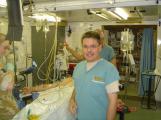5
CHRISTIAN BORLANDOne example of the wide range of services provided by the modern Canadian Armed Forces can be illustrated by taking a look at the career of Major Christian Borland. At the age of 16, Borland joined 18 (Thunder Bay) Service Battalion. Choosing to attend school to become a nurse, Borland trained outside of the military during the Trudeau cutbacks of the early 1980s. In 1984, he graduated as an RN and decided to continue his military service. Major Borland served the Naval Reserve on HMCS CHIPPEWAin Winnipeg and HMCS YORK in Toronto, before moving back to HMCS GRIFFON in Thunder Bay. Here he reached the rank of Master Seaman before being commissioned with 18 Medical Company (which became 18 Field Ambulance in 2003).
During the Bosnian conflict, Major Borland spent 7 months in Bosnia with Role 3 Multinational Integrated Medical Unit at Sipovo Garrison in a Serb Republic. He was one of only six Canadians in this group which also included Brits, Dutch, and Czechs. Working with such a diverse group proved difficult, according to Borland, as not only language, but also training and even names of medicines differ from one country to the next. In the next major conflict involving Canadian soldiers, Major Borland served 3 tours in Afghanistan (totaling 1 year) during the 2006-2008 period. Once again Borland served with Role 3, this time at Kandahar Airfield as a Critical Care Nurse, where he had a key role in helping resuscitate and treat trauma injuries.
On Canadian soil, Borland was a part of Operation Noah and later provided assistance in Winnipeg during the Red River flood as Flight Nurse. During this disaster, Borland was involved in the rescue of victims of the flood with the use of a helicopter. Borland also participated in Operation Podium, which provided support for a six-month period around the 2010 Winter Olypmics, which took place in Vancouver, BC.
Outside of the military, Borland has worked for nearly 14 years at the Thunder Bay Regional Health Sciences Centre as of 2010. Also, he has worked as a contract nurse in Saudi Arabia, in the Canadian Arctic, and Northern Ontario. Borland’s widespread training history mirrors his varied experiences with the Ministry of Health. He has completed qualification as a Flight Paramedic with the Armed Forces, graduated from Seneca College’s Medic Program, continues to be an accredited mortician and has received further military medical training at Vancouver General Hospital.
6
Major Borland in Emergency Room - Role 3 Multinational Hospital25 September 2007
Kandahar, Afghanistan
 Credits:
Credits:Major Christian Borland
Thunder Bay Miltiary Museum and History Society